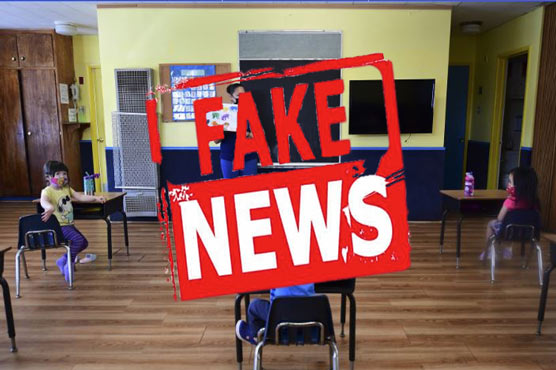Posts falsely claim face mask use harms children

Posts falsely claim face mask use harms children
(AFP) - A post spreading on social media claims that wearing face masks to help stop the spread of Covid-19 will cause children physical and psychological problems. But medical and psychological experts say the claims it makes about masks are false, and the post is part of a larger disinformation campaign.
“Facts about masks,” says the title of a January 5, 2021 Facebook post. It lists oxygen deprivation, bacterial infection and psychological damage as three dangers that face masks allegedly pose to children.

The post includes a link to a globalresearch.ca page, which published a transcript of a German doctor’s claims about masks and their adverse effects. AFP debunked her claims.
In August 2020, the US State Department described globalresearch.ca as “deeply enmeshed in Russia’s broader disinformation and propaganda ecosystem” and “a steady source of anti-US and anti-Western disinformation and propaganda.”
A report by Newsguard, an independent technology company that assesses the trustworthiness of online content, said the website “severely violates basic standards of credibility and transparency” and “has repeatedly published false information, including unsubstantiated claims in 2020 about the Covid-19 virus.”
The site has previously published at least two false stories whose claims were both debunked by AFP.
In response to the Covid-19 pandemic, Dr Theresa Tam, Canada’s chief public health officer, has recommended the use of face coverings since May 2020.
Canadian provinces have instituted a range of mandatory mask orders, including on public transport. Masks are also required on airplanes.
But masks remain a polarizing topic in Canada. Hugs Over Masks, a Canadian anti-mask group, has spread
misinformation debunked by AFP Fact Check. The group also created a “mask exemption form,” which Doug Ford, the premier of Ontario, described as “fraudulent” and “unacceptable.”
Below, AFP Fact Check breaks down the false claims about the risks of face masks for children.
Claim 1: Oxygen deprivation and CO2 poisoning
Allison Messina, who chairs the Division of Infectious Disease at Johns Hopkins All Children’s Hospital, told AFP by email that “masks do not cause oxygen deprivation in children nor (in) adults. Plenty of oxygen gets through and around masks. Children over two can safely wear masks.”
This was confirmed by Philipp Lepper, a member of the German Society for Pneumology and Respiratory Medicine (DGP) and senior physician at the Saarland University Hospital.
“Since the amount of air behind the mask is very small and is mixed with fresh air each time you breathe in, this has no effect on the oxygen and carbon dioxide levels measured in the body,” Lepper said in this AFP Fact Check.
The claim that masks increase the risk of CO2 poisoning was also refuted by Vinita Dubey, Associate Medical Officer of Health at Toronto Public Health.
“Prolonged use of a face mask, including the N95, has not been shown to cause carbon dioxide toxicity in healthy people. If CO2 slowly builds up in the mask over time, the levels are low and mostly tolerable,” Dubey said in a separate fact check by AFP.
Claim 2: Bacterial infection
It is false to claim, as the post does, that in the “warm and moist environment of the mask, bacteria, virus’ and spores thrive especially well,” making the mask wearer “very sick.”
“There is zero evidence that masks can cause bacterial lung infections,” Sean O’Leary, Vice-Chairman of the American Academy of Pediatrics’ (AAP) committee on infectious diseases, said by email.
“Our noses and throats contain billions of bacteria, so the additional bacteria that could grow in a mask are a drop in the bucket compared to that. This is absolutely misinformation.”
O’Leary added that masks may have had a positive impact beyond slowing the spread of Covid-19.
“We are seeing dramatic decreases in non-Covid lower respiratory tract infections, probably in large part due to the wearing of masks,” he said.
Scott Halperin, professor of pediatrics, microbiology, and immunology at Dalhousie University, agreed via email, saying: “This claim makes no scientific sense.”
“Those organisms on the inside aspect of the mask are the wearer’s own microbiological flora which may contain a pathogen, but only a pathogen that the individual already has,” Halperin said.
Johns Hopkins’ Messina said the use of masks in medicine and surgery dates back decades, and the risk of bacterial infection from them “has never been an issue.”
Claim 3: Psychological damage and stress
The post also claims that “psychological damage” can result when children are unable to communicate adequately or recognize emotions, and says that face masks can “fuel anxiety and cause stress.”
Jennifer Katzenstein, Director of Psychology and Neuropsychology at Johns Hopkins All Children’s Hospital, said by email that: “Masks are not preventing children from communicating adequately with others, and many, many children have been quite resilient throughout the pandemic and are doing quite well.”
Rather than masks leading to anxiety and stress, “misinformation and uncertainty appear to be the primary drivers,” Katzenstein said, also dismissing the claim about emotions.
“Eyes and facial expressions can still be conveyed,” she said.
Christina Rinaldi, a professor at the University of Alberta’s Educational Psychology Department, said by email that she was unaware of any psychological studies supporting the “far-reaching claim” in this post.
‘“It is very difficult to claim ‘cause,’ so just with that it can be discredited,” she said.
The AAP’s O’Leary added that “with widespread mask use, the vast majority of children have adapted very quickly (we hear more complaints from adults than kids for example).”
“If a parent has concerns that their child is not adapting well to mask use, they should discuss that with their pediatrician,” he said.

